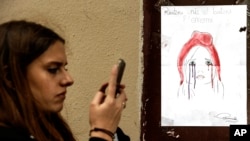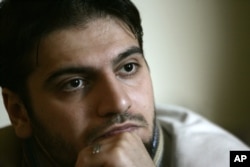Last Friday’s terrorist attacks on Paris loosed deadly gunfire and suicide bombs – and set off continuing reverberations on Twitter and Facebook. Much of the resulting communications blitz assails the Islamic State group, which has claimed responsibility for the siege and also has shown frightening command of social media.
But some of the messaging targets the Islamic religion itself, claiming it endorses bloodshed. And that has drawn volleys of responses from defenders of the faith or simply of tolerance.
The Paris attacks were "straight out of the 'Prophet' Muhammad’s playbook," tweeted Peter Townsend, the author of "Questioning Islam."
"I am a Muslim. I condemn the ParisAttack. Over 1.5 billion Muslims do," Sami Yusuf, the Iranian-born British singer-songwriter, said in a Twitter account managed by his team.
"ISIL's strategy is to split the world into two camps. It is that black and white," Waleed Aly, host of the Australian news-talk show "The Project," observed on Monday night’s edition. An excerpt went viral on Facebook, surpassing 22 million views as of this writing.
"… This evil organization has it in their heads that if they can make Muslims the enemy of the West, then Muslims in France and England and America and here in Australia will have nowhere to turn but to ISIL," Aly continued.
His assessment dovetails with that of French-American anthropologist Scott Atran, who has written extensively about terrorism.
"The greater the reaction against Muslims in Europe, the deeper the West becomes involved in military action in the Middle East, the happier ISIS is," VOA quoted Atran as saying in a story Monday.
The terrorists want to deepen divisions – to divide and conquer.
Making distinctions
The Paris attacks reignited use of the Twitter hashtag NotInMyName, which emerged last year in defense of Islam as the IS terrorist threat spread. It’s credited to the Active Change Foundation, a London-based charity that supports youth leadership and works to halt violent extremism.
"Stop Islamophobia. There are almost 2 billion Muslims around the globe. We are not terrorists," Syed Mahmood Kazmi tweeted Tuesday, coupling that hashtag with another for peace.
Kazmi, 24, is a peace activist working in New York. A Pakistan native, he told VOA he came to the United States last year, and "everyone has been so welcoming here."
But since the Paris attacks, he has encountered online hostility because of his faith, he said. "People started criticizing me, they were cursing me.”
He asked that news media refrain from describing the terrorists as Islamic or Islamist, because the association "puts Muslims at risk for our lives."
An offshoot
Showing solidarity with Muslims, and distinguishing them from extremists, led Brazilian Caio Leonardo to introduce a new hashtag: NotInMyNameEither.
Shari Eaton, from the U.S. upper Midwestern state of Minnesota, felt compelled to use it Tuesday to rebuke prominent American evangelist Franklin Graham. He’d tweeted, "Islam is not a peaceful religion…."
"NO – you do NOT speak for me as a Christian," Eaton challenged, using the new hashtag.
"These ISIL members are no more Muslim than KKK members are Christian," Eaton told VOA, using acronyms for both the Islamic State and then the Ku Klux Klan, a brutal white supremacist group that emerged after the 1860s U.S. Civil War to repress newly freed black slaves.
Confronting prejudice and misunderstanding is personal for Eaton, 54. She’s a nurse at a downtown Minneapolis hospital, where "we have a lot of immigrants working on my floor."
Not long ago, a nursing assistant confided that she’d taken care of a patient who called her a terrorist, a charge that "left her in tears," Eaton said, her own voice quavering at the indignity. "Thankfully, our hospital responded well and talked to the patient about not allowing a hostile environment" for staff.
Educating online
NotInMyName and its offshoot, along with hashtags such as PeaceForParis illustrate how an effective tag serves as "a modern-day tool for social movements," Peter Kaufman told VOA’s Techtonics blog.
A sociologist at the State University of New York in New Paltz, Kaufman noted that because hashtags "have the potential to go viral, they can also bring rapid awareness to an issue across borders."
The Paris attacks have sparked fears of an anti-Muslim backlash, and some are tapping social media to halt it and to educate.
The Washington-based Pew Research Center, for instance, tweeted out results of a poll showing great disdain for the Islamic State among nations with sizeable Muslim populations.
And the Southern Poverty Law Center, a U.S.-based rights organization, will host a Twitter chat on Wednesday as part of its Teaching Tolerance project. Educators can share ideas for countering Islamophobia in the classroom. The hourlong chat is set to start at 6 p.m. Central time (just after midnight Thursday GMT) at #talktott.
VOA's Aida Akl contributed to this report.





